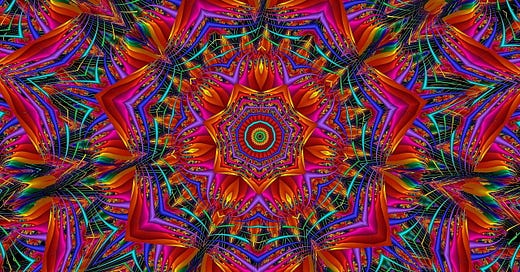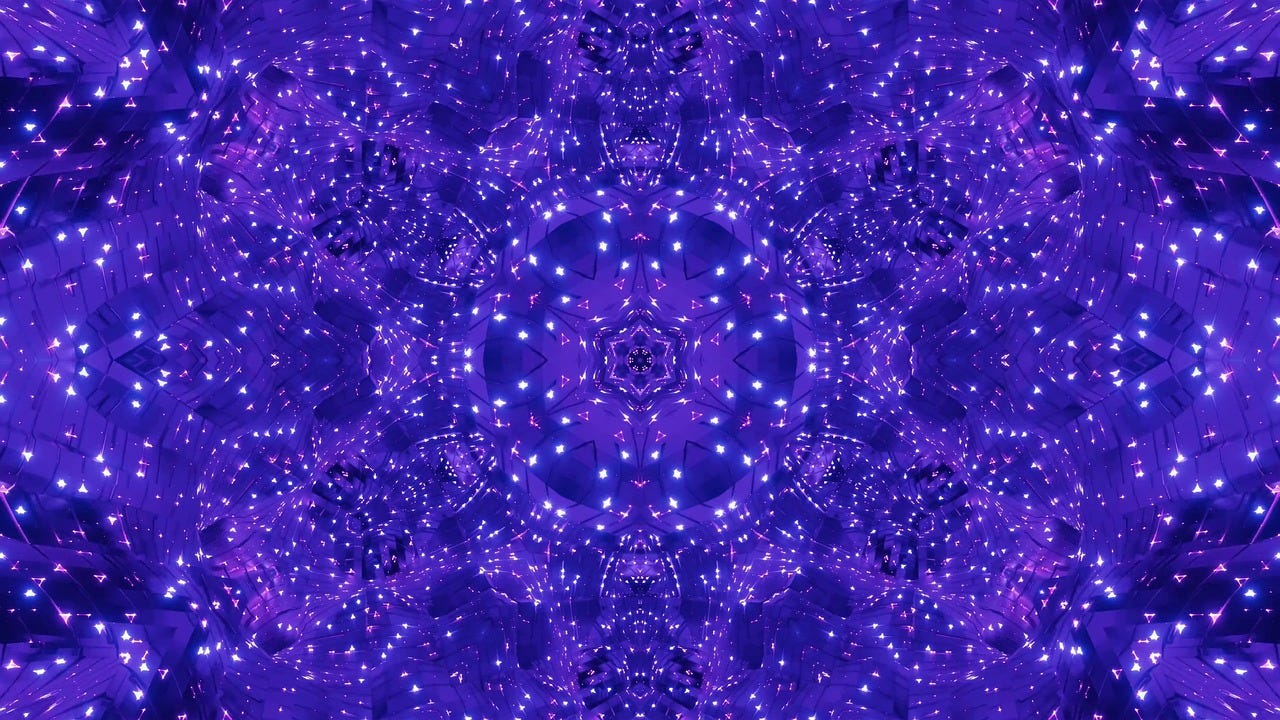A kaleidoscope is an instrument for looking at beautiful forms, formed of the Greek words - kalos - beautiful, eidos - form and skopian to look. Having admired the many beautiful, brave perspectives shared around #MentalHealthAwarenessWeek, I wanted to contribute yet felt unable to squeeze my reflections into a short-form post. So I’ve come here to share a few turns of the kaleidoscope on the beauty of the self, based on the understanding that self-discovery is a uniquely personalised process and everyone finds their own way.
Awareness Raising
Much of our mental load arises from our conditioning - the social norms we learn as children and are exposed to daily. Some of this is helpful - learning how to cross a road safely, tie shoelaces or behave respectfully at a funeral. Some of it is not - such as inheriting and / or internalising taboos, biases or prejudices embedded within our social, cultural and familial settings. As much of this received programming embeds in our unconscious, we can start to loosen its hold by bringing it to our conscious awareness. With a turn of the kaleidoscope, we can shift our perspective, which empowers us to choose, act and think differently.
Curating Content
Distracted and dizzied by the sheer amount of information we can receive and potentially create, it’s easy to forget that we have the creative power to curate our lives both on and offline. Setting boundaries about what and when we want to give and receive is key to forging and finding our pathway through life. This is, of course, a daily, moment-to-moment process involving constant negotiation and navigation.
So it was a small but significant act of self-care during #MentalHealthAwarenessWeek to switch off Facebook notifications urging me to post more to get more views. For, to be honest, less posting and scrolling is often a sign of my being more fully engaged in life and experiencing better mental health. Ideally, I would receive notifications saying: “Congratulations - your screen time is down by 33% this week!” or “Well done - you’re hardly spending any time on Twitter,” or “Amazing! - you’re making focused use of social media to create meaningful, fun content and connections without getting distracted from real life.” It’s a daily self-care practice to offset addictive social judgement machines which quantify us by our vital statistics - age, weight, bank balance and likes.
Quality of life cannot be determined by quantity of likes.
Self-Directing Diagnosis
The explosion of Western pop psychology in the media has democratised therapy. Definitions of personality types such as narcissist and empath are now everyday terms, as are diagnoses such as ADHD, helping to de-stigmatise mental health issues. Identifying and discussing mental health conditions is essential for accessing vital forms of support. Whilst mental health services remain chronically overloaded and underfunded, many innovative community-led initiatives have sprung up such as Andy’s Man Club which supports men to talk openly together or Hip-Hop Heals, aiming to reduce trauma and suicide in young people.
Whilst these shifts of language and awareness are to be celebrated, the proliferation of labelling can become constrictive. We need, I believe, to be mindful of the measuring sticks we use to quantify our mental health and guard against trying to live up to an unobtainable or homogenised state of ‘normality.’ Who, after all, gets to define what ‘normal’ is? It is often our systemically unjust societies that are unwell, rather than those struggling to live within them.
It can sometimes seem that oppressive tropes such as ‘the mad artist’ are being perpetuated in the labelling of creatives as ‘neurodivergent,’ pathologizing and medicating the much-needed wild, eccentric and rebellious aspects of humanity. This is despite extensive research on the invaluable contribution of arts and nature to mental well-being underlining the importance of taking a walk on the wild side. In my work leading choirs in mental health groups and hospitals, I hear singers reporting significant wellbeing benefits such as increased confidence, self-esteem, focus and mood uplift. So taking a creative, rather constrictive approach to mental health is essential.
To share a personal example, having been a child who struggled with coordination, PE and riding bikes, I embarked on a journey to improve. I found support for my vulnerable aspects both internally through my stronger aspects and externally through nurturing friends and creative movement including dancing, yoga and walks in nature. As I built the confidence to bike round London, I learned to love and accept my quirkiness, rather than aspire to an external norm. Only later did I have a eureka moment when I learned about dyspraxia. Whilst it offered another kaleidoscopic turn towards greater self-compassion, it has never been a label determining what I do or who I become.
Diagnoses can be helpful tools rather than definitive labels or deterministic identities.
Authentic Self Love
‘Treat yourself,’ ‘You deserve it!’ - the concept of self-love has been so fully assimilated by Western commercialism that it’s now used to sell everything from designer handbags to yoga retreats. Self-love slogans adorn T-shirts, jewellery, notebooks and candles, while 30-second guides to loving yourself fill our screens. In some ways, the arrival of self-love in the mainstream signals a welcome shift in awareness; in others, it can distract and derail us from cultivating authentic self-love.
Commercialised Self-Love puts the onus on the individual to love themselves in isolation from social or community context. Self-love is marketed as available via socially acceptable formulas such as gym memberships and consumer status symbols such as expensive gym gear. When self-love becomes a box-ticking exercise with a high price tag, social injustices go unchallenged.
Authentic Self-Love - is a multi-layered, life-long journey of cultivating and maintaining a healthy inner life, within which our self-concept is a multi-faceted diamond. Over many years of coaching clients and life experiences, I’ve come to see healing as a process of bringing to awareness, embracing and integrating the many aspects of the self - including those we find challenging. This transformative process acknowledges social and communal contexts, empowering us to heal trauma and overcome unhelpful conditioning. As we learn to lovingly and compassionately hold all aspects of ourselves, we restore faith in our innate innocence - inner sense. Seen this way, life becomes an adventure of self-discovery.
Our quirks and foibles become a source of creativity, growth and learning, as we cultivate compassion for our humanity and allow our greatness to shine.
Befriending Our Inner Voice
Our daily experience, as it evolves through multiple moods, feelings, thoughts and sensations, is witnessed by our conscious self which broadcasts internal notifications, commentaries, narratives, instructions and reflections. As the quality of our inner speech can directly impact our mental well-being, we can learn to cultivate healthy self-talk - from celebrating and cheerleading ourselves to evaluating when we need to make amends. As we re-tune our self-talk, we can listen and attend to our hunches, intuitions and the promptings of our conscience, easing our navigation through life.
Know Thyself, Grow Thyself
Taking a wider lens on the bigger picture, it can be liberating to jump into the creative slipstream of life and acknowledge that we are a constantly changing being living in a constantly changing world. This releases the striving to squeeze ourselves into a fixed identity, allowing continuous growth and evolution. Growth becomes possible when we allow space for the new. Confidence, (Latin for with faith) creativity and courage grow when we allow ourselves to venture into the unknown. Compassion develops as I love, forgive and learn from the experiences of the person I was yesterday in becoming the person I am today and growing into the person I may become tomorrow.
Ubuntu - I am because we are
This guiding principle of Archbishop Desmond Tutu, acknowledges our interconnectedness with everything on earth, recognising that we grow by contributing and receiving from our families, communities, ecologies and societies. Finnish Psychologists have experienced great success by using ‘open dialogue’ to build professional, social and familial support around those experiencing psychosis. Mental health does not occur in a vacuum - healthy relationships encourage, support and challenge us to grow. As we develop self-love, we cultivate more loving awareness in our relationships and become empowered to transform issues and injustices impacting our personal and communal well-being.
The Ever-Turning Kaleidoscope
Carl Jung famously described the fully integrated self as a mandala and I also see it as a many-petalled rose. The Rose Window at St Alban’s Abbey where I grew up is a rose mandela, which I see from a different perspective each time I visit. Each new day and moment offers the chance to unfold another petal, turn the kaleidoscope and view ourselves and life afresh.











Wise words, Katie!